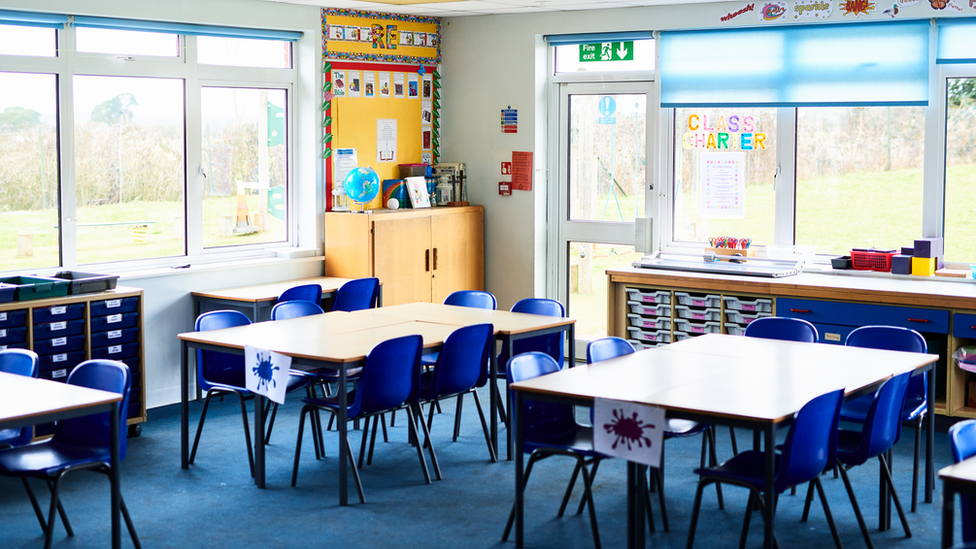School absence fines for parents to rise by £20 in England
- Published

Fines for parents taking children out of school without permission will rise across England from September.
The minimum fine will increase from £60 to £80 per parent as part of a government drive to return attendance to pre-pandemic levels.
One school told BBC News one out of every three of its pupils absent without permission had been on a family holiday during term time.
A head teachers' union said fines were needed to avoid "chaos" in schools.
Local authorities currently have their own policies on when to issue fines, so the likelihood of parents being fined depends on their school's location.
In a 2022 investigation, some local authorities told BBC News no penalties had been issued, while others handed out thousands in one year.
But in an attempt to create a more consistent approach across England, new guidelines tell schools to consider a fine after a child has missed five days' school without the head teacher's permission.
If parents fail to pay their fine within 21 days, it doubles.
The £60 fine was introduced in 2013 and has not been increased in the 11 years since.
Head teachers will retain some discretion over which cases to send to the council for potential fines and where support is needed.
Education Secretary Gillian Keegan told BBC News most fines were for unauthorised term-time holidays.
Families with absent children should first be offered support - but fines were an important option.
"If it's a deliberate decision to take your child out of school for unauthorised absence, then that's something we do not want to encourage," Ms Keegan said.
"We have to get children back in school, otherwise they can't get access to a fantastic education."
But the tougher approach will prove controversial with parents struggling to afford a holiday or who feel let down by the school system.
Fine felt like a 'mockery'
Single mum Anusha Iyer, from Halifax, was fined last year after taking her son out of his Year 4 class when her elderly father fell ill in India.
She said she had told the school ahead of time about their need to travel, but was made to pay the fine on her return anyway.
She ultimately gave up on appealing against it after feeling like she was "hitting her head against a brick wall".
"Sometimes you have to look after your family, especially when they're frail and old," she said.
"Parents get poorly when they get poorly - I can't tell them to only get ill during the school holidays."

Anusha Iyer says she felt "let down" by the decision to fine her for the trip to India to care for her sick father
She said she felt especially let down because she regularly home-schools her son on top of his normal school work, so to be fined for "neglecting" his education felt like a "mockery".
Some parents at Willows Academy, in Grimsby, tell primary head teacher Sarah Cox they cannot afford to go on holiday outside of term time.
Almost half of her pupils qualify for free school meals - about twice the national average.
The school has better-than-average attendance, which Mrs Cox puts down to the support offered to pupils and parents.
But in the run-up to October half-term, one out of every three of its pupils absent without permission was on a family holiday.
Fining parents is a last resort, Mrs Cox says.

Parents of children at Sarah Cox's school say they cannot afford to go on holiday outside of term time
"We feel that doesn't have an impact," she says.
"The thing that most supports our parents in understanding the importance of children being in school is the relationships."
Mrs Cox prefers to appeal to parents' consciences, pointing out just a few missed days could put pupils behind in reading or maths.
At a soft-play centre in Redcar, Yorkshire, Charlotte Williams, holding her seven-month-old son, said fining parents for taking term-time holidays was "awful" because it might be the only time they could afford to go abroad.
Asked about the lost learning children taking term-time holidays might face, she said: "I actually think that they can do learning in other countries as well - it's educational, going away."

Charlotte Williams says term-time holidays might be the only way families can afford to take children abroad
Daniel Philips, from Buckinghamshire, says he is saving £1,600 this year by taking his family of four to Egypt during term-time in September, rather than in the summer holidays.
He says increasing fines by £20 "isn't going to deter people in the slightest".
"The root problem here is the companies charging through the nose during school holidays - it's not fair," he said.
"If I could book a holiday in August for the same price, my son wouldn't be out of school."
The changes being set out on Thursday come after slow progress to improve school attendance since the pandemic - a problem other UK nations and other countries have also struggled with.
Persistently absent children are defined in England as those who have missed at least 10% of school, which adds up to about one month across a school year.
In autumn 2019, 15% of secondary and 11% of primary pupils were persistently absent.
But in the autumn term of the current school year, 24% of secondary and 16% of primary pupils were classed as persistently absent, in government figures published last week, external.
Geoff Barton, of the Association of School and College Leaders, said if everybody took term-time holidays, it would be "chaos" in schools - and fines gave a clear signal they were unacceptable.
But there were wider issues for some pupils with anxiety or poor mental health - and schools needed more help to deal with them.
The government has increased mental-health support for schools and plans to create more school places for children with special educational needs and disabilities.
But the demand for both is high and many parents say they struggle to access the support they need to keep their child in school.
As a result, the number of home-educated children has been growing.
The Liberal Democrats say a trained mental-health professional is needed in every school.
Labour's shadow education secretary, Bridget Phillipson, said her party would improve attendance by bringing in breakfast clubs for all primary pupils, as well as a register of all children not in school.

Have you been fined for your child missing school? Do you think the new rules will help solve attendance problems? Share your experiences by emailing HaveYourSay@bbc.co.uk, external.
Please include a contact number if you are willing to speak to a BBC News journalist. You can also make contact in the following ways:
WhatsApp: +44 7756 165803
Tweet: @BBC_HaveYourSay, external
Please read our terms and conditions and privacy policy
If you are reading this page but cannot see the form, visit the mobile version of the BBC website to submit your question or comment, or email HaveYourSay@bbc.co.uk, external. Please include your name, age and location with any submission.
Related topics
- Published30 September 2022

- Published7 January 2024

- Published7 March 2023
